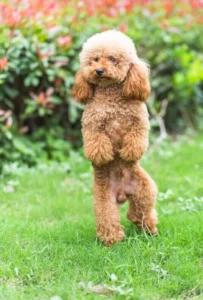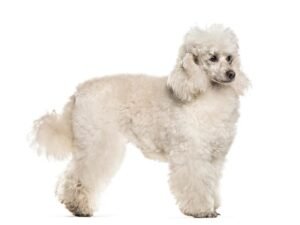19
Poodle article by Sadiq Amin:
The Poodle poois a highly intelligent, versatile, and elegant dog breed known for its curly coat and friendly, affectionate nature. Here are some key details about poodles:
1. Origins
- The Poodle originated in Germany but is most closely associated with France, where it became a popular companion dog. Historically, they were bred as water retrievers, particularly for duck hunting.
2. Types of Poodles
- Standard Poodle: The largest variety, typically standing over 15 inches tall at the shoulder. They were originally bred for hunting.
- Miniature Poodle: Smaller than the Standard but larger than the Toy, standing between 10-15 inches tall. They were bred as companion dogs.
- Toy Poodle: The smallest variety, standing up to 10 inches tall. They were bred as lapdogs and companions.
3. Physical Characteristics
- Coat: Poodles have a dense, curly coat that is hypoallergenic, making them a popular choice for people with allergies. The coat requires regular grooming and care to prevent matting.
- Color: They come in a variety of colors, including black, white, apricot, brown, and gray.
- Build: Poodles are well-proportioned, with a square, athletic body and a proud stance. Their ears are long and their tails are often docked or left in their natural state, depending on the region.

4. Temperament
- Intelligence: Poodles are one of the smartest dog breeds. They are highly trainable, eager to please, and excel in dog sports and obedience competitions.
- Personality: Poodles are known to be friendly, social, and affectionate. They are good with families, children, and other pets, though they can be reserved or aloof with strangers.
- Energy Level: Poodles are active and enjoy mental and physical stimulation. They need regular exercise, such as walks, playtime, and opportunities to engage in problem-solving activities.
5. Health and Lifespan
- Lifespan: Poodles have a relatively long lifespan, typically living between 12 to 15 years or more.
- Health Concerns: Poodles are generally healthy but may be prone to specific conditions such as hip dysplasia, progressive retinal atrophy (PRA), and Addison’s disease. Regular veterinary checkups are important to maintain health.
6. Training and Socialization
- Training: Due to their intelligence, Poodles are easy to train but can become bored with repetitive tasks. They thrive with positive reinforcement and enjoy activities that challenge them mentally.
- Socialization: Early socialization is key to preventing any shyness or wariness around strangers. Poodles tend to do well with other dogs and pets, provided they are socialized from an early age.
- If your poddle is uncontrolled visit site for training.
7. Grooming
- Coat Care: Their curly coat requires regular trimming (every 6-8 weeks for professional grooming). Daily brushing is also needed to prevent mats and tangles.
- Shedding: Poodles shed very little, which is why they are often considered a hypoallergenic breed.

8. Fun Facts
- Poodles have been historically used in circus performances due to their agility and ability to learn complex tricks.
- Despite their sophisticated appearance, Poodles are playful and often enjoy water activities, reflecting their heritage as water retrievers.
Summary:
They are a highly adaptable, intelligent, and affectionate breed that excels in a variety of roles, from family companions to show dogs and performance artists. They require a fair amount of grooming and mental stimulation, but in return, they are loyal and loving companions.
Meet a loyal companion in form of cat breed Abyssinian.
Also read our article https://brainpedia360.com/german-shepherd/